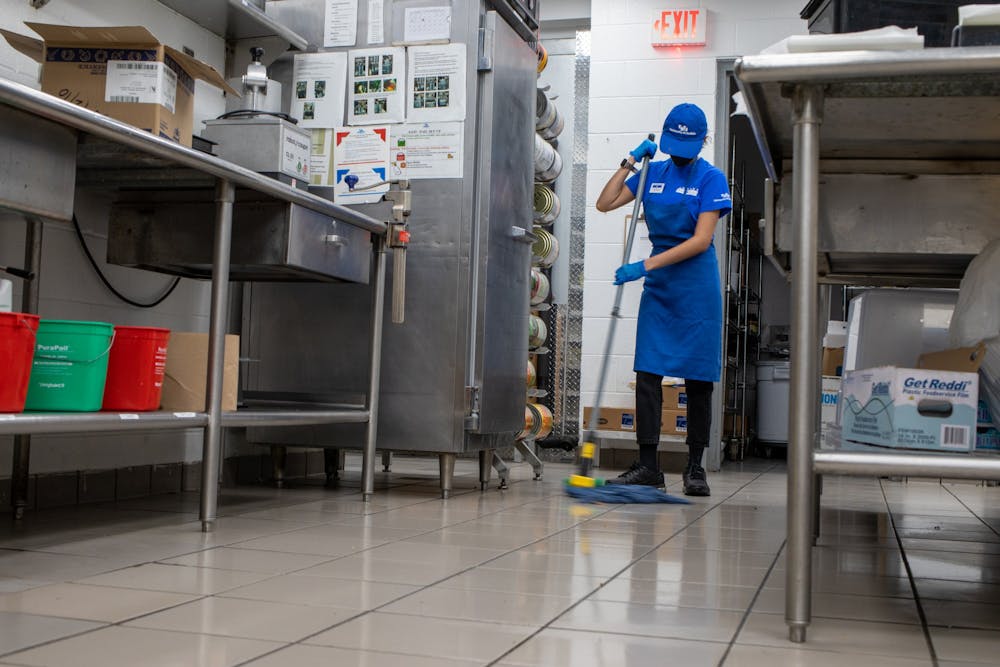Mara Dingman was a seasoned student-employee at Campus Dining and Shops.
She started working at C3 in 2019 to make some extra money. Dingman served other students, washed dishes and wiped tables for most of her undergraduate career and all throughout the COVID-19 pandemic. And when she lived in Red Jacket, she didn’t even have to leave the building to start a shift.
But after the 2021 spring semester, she called it quits — and not just because she wanted more time to study.
“There’s so many better jobs that I could get that are going to either give me better benefits or pay me more than minimum wage or just require me to do different work that isn’t that type of food service,” Dingman, a Spanish major who graduated last semester, said of her thought process at the time.
In the wake of COVID-19 and the “Great Resignation,” Campus Dining and Shops, the organization that operates UB’s dining halls and food service operations, is “continuing to rebuild from pre-pandemic employment levels” and increase staffing at night and on the weekends, according to Ray Kohl, director of marketing and communications for Campus Dining and Shops. That effort led CDS to start offering $16 per hour to student employees who work after 7 p.m. on weekdays or on the weekends, a $2.80-increase over the $13.20 per hour, New York State’s minimum wage, that student workers normally make.
“This increase is in recognition of the efforts of all of our student employees who work these shifts and in an effort to increase staffing levels during these hours to better serve our guests,” Kohl said in an email to The Spectrum.
Student-workers with previous food service or retail experience “are able to earn $15 an hour,” Kohl said. Regardless of previous experience, student workers also earn meal credits on days they work a shift, but those credits expire by the next day.
But minimum wage is lower than what students can make working in food service off campus. McDonald’s, Tim Hortons and Mighty Taco, for example, all offer at least $15 per hour to employees in the Buffalo area.
CDS is largely dependent on international student-workers, who are barred from working most off-campus jobs under federal law. Students with F-1 visas, the kind given to full-time international students, are only permitted to work on-campus jobs after completing their first year of study, according to the U.S. Department of Homeland Security, and can’t participate in work-study programs. That leaves international students at UB with few employment opportunities other than Campus Dining, as it is “one of the few departments that provides a pathway for international students to obtain a social security card for employment in the U.S.,” according to Kohl. Campus Dining employs 400-500 students per semester, the “majority” of which are international students, Kohl said.
Dipanshu Maheshwari, a first-year graduate student from India studying financial mathematics, used work experience as a hostel secretary to get a CDS job in the Governors Dining Center.
“To make my living expenses, I have to do part-time work,” Maheshwari said.
Students with F-1 visas can only work 20 hours per week when school is in session, but Maheshwari says he only gets assigned three shifts, about 16 hours worth of work. That’s enough to make ends meet, but it doesn’t leave him with a lot of extra money.
“If there was a [way], then maybe I would try to get two different jobs, so that I can learn different things, and, moreover, I would get paid extra,” he said. “But still, we have constraints.”
Sai Krishna Reddi, a graduate student from India studying industrial engineering, didn’t know that off-campus food service jobs paid more until his interview with The Spectrum, but says he’s accepted working on campus with CDS.
“We [international students] don’t have an option other than this. That’s OK,” Krishna Reddi said. “We just got the job… At least we are getting something rather than nothing.”
New York State’s minimum wage is set to rise to $14.20 on Dec. 31, 2022.
Grant Ashley is the managing editor and can be reached at grant.ashley@ubspectrum.com

Grant Ashley is the editor in chief of The Spectrum. He's also reported for NPR, WBFO, WIVB and The Buffalo News. He enjoys taking long bike rides, baking with his parents’ ingredients and recreating Bob Ross paintings in crayon. He can be found on the platform formerly known as Twitter at @Grantrashley.





